Chris Pratt The Magnificent Seven
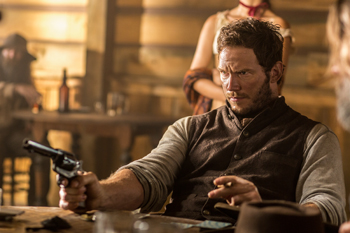
Chris Pratt The Magnificent Seven
Cast: Ethan Hawke, Chris Pratt, Denzel Washington, Vincent D'Onofrio, Matt Bomer, Haley Bennett
Director: Antoine Fuqua
Genre: Action, Western
Rated: M
Running Time: 133 minutes
Synopsis: Director Antoine Fuqua brings his modern vision to a classic story in Metro-Goldwyn-Mayer Pictures and Columbia Pictures' The Magnificent Seven. With the town of Rose Creek under the deadly control of industrialist Bartholomew Bogue (Peter Sarsgaard), the desperate townspeople, led by Emma Cullen (Haley Bennett), employ protection from seven outlaws, bounty hunters, gamblers and hired guns – Sam Chisolm (Denzel Washington), Josh Faraday (Chris Pratt), Goodnight Robicheaux (Ethan Hawke), Jack Horne (Vincent D'Onofrio), Billy Rocks (Byung-Hun Lee), Vasquez (Manuel Garcia-Rulfo), and Red Harvest (Martin Sensmeier). As they prepare the town for the violent showdown that they know is coming, these seven mercenaries find themselves fighting for more than money.
The Magnificent Seven
Release Date: September 29th, 2016
About The Production
'When MGM asked me about making a Western, I got excited about the possibility of it, because I grew up with Westerns," says Antoine Fuqua, who re-teams with Denzel Washington in the story of seven outlaws, gunslingers, gamblers and bounty hunters who band together to save a town under the thumb of corruption in The Magnificent Seven. 'So I asked myself, -Why make a Western now? Why would it be important?' And the answer was, the idea of tyranny, happening in our world today – that's what made it timely. You'd need a special group of people to come together to fight tyranny." Antoine Fuqua also has an affinity for the genre, having as a young boy watched Western films with his grandmother.
'There's a theme about being unselfish and self-sacrificing – these men, all of whom live outside the law, do something selfless to help a community, and there's nothing in it for them except helping others," says producer Roger Birnbaum. 'They pull themselves up by their own bootstraps and dig deep inside to fight an outside force, facing impossible odds… seven men against an army… they know people will die… and they do it for no other reason than it's the right thing to do."
'An older generation might know this title, but today's generation doesn't, and that made it ripe for a retelling," says Todd Black, who joined Roger Birnbaum as a producer. 'Antoine Fuqua's visceral, intense filmmaking brings a very contemporary and stylish feel to a classic story about a band of brothers. At its heart, it's a simple story of men doing what's right – that's something I try to find in every movie that I do."
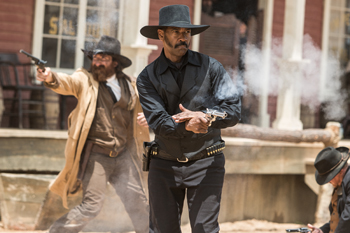 The idea began with Roger Birnbaum, who previously served as Co-Chairman and Co-CEO of Metro-Goldwyn-Mayer, coming in to head the studio with his former partner, Gary Barber, in 2010. 'At the time, there wasn't very much in development, so we had to start from scratch," says Roger Birnbaum. 'We were looking at MGM's wonderful library, and staring me in the face was The Magnificent Seven, a film I loved as a young boy and later on as a student of cinema, when I learned of the evolution of the film from The Seven Samurai. It's a classic story and I thought it was worth retelling." Later, when Roger Birnbaum left the studio to work as a producer, The Magnificent Seven became his first project. Columbia Pictures came on to partner with Metro-Goldwyn-Mayer on the project. In this way, Antoine Fuqua's retelling of The Magnificent Seven would be a retelling for our time, and the filmmaker approached that in several ways – most notably, with the lead actors. 'I needed something that you haven't seen yet, a perspective that has not been on the screen with the Western," Antoine Fuqua recalls. 'So I said, -What about Denzel Washington?' And the room went completely silent – until there was an eruption. -That would be amazing. You think he would do it?'"
The idea began with Roger Birnbaum, who previously served as Co-Chairman and Co-CEO of Metro-Goldwyn-Mayer, coming in to head the studio with his former partner, Gary Barber, in 2010. 'At the time, there wasn't very much in development, so we had to start from scratch," says Roger Birnbaum. 'We were looking at MGM's wonderful library, and staring me in the face was The Magnificent Seven, a film I loved as a young boy and later on as a student of cinema, when I learned of the evolution of the film from The Seven Samurai. It's a classic story and I thought it was worth retelling." Later, when Roger Birnbaum left the studio to work as a producer, The Magnificent Seven became his first project. Columbia Pictures came on to partner with Metro-Goldwyn-Mayer on the project. In this way, Antoine Fuqua's retelling of The Magnificent Seven would be a retelling for our time, and the filmmaker approached that in several ways – most notably, with the lead actors. 'I needed something that you haven't seen yet, a perspective that has not been on the screen with the Western," Antoine Fuqua recalls. 'So I said, -What about Denzel Washington?' And the room went completely silent – until there was an eruption. -That would be amazing. You think he would do it?'"
Antoine Fuqua and Denzel Washington have a very strong relationship. 'Antoine Fuqua and I have obviously had great success," says Denzel Washington. 'We won our Academy Award® with Training Day and had great financial success with The Equalizer. He's a master filmmaker – he knows what he's doing and he allows me to do what it is I know how to do. We're a good fit." Todd Black says that he thinks Denzel Washington was likely drawn to the project for a number of reasons. 'I think Denzel Washington wanted to do it because he had never done a Western. He rarely does ensembles, and I think he thought it would be fun to do one. It was a different way for him to do an action film. He had a strong relationship with Antoine. But most of all, it was different, and he's always looking for different."
Naturally, Washington was also drawn by the chance to play Chisolm, the leader of the seven. 'There are those who have been put on this Earth to protect the innocent," says the actor. 'For this town, he is the right man at the right time."
With Denzel Washington leading the way, the filmmakers reached out to Chris Pratt to play the gambler Josh Faraday, Chisolm's right-hand man and the first person who joins Chisolm in the seven. Chris Pratt jumped at the chance, speaking for many of his co-stars when he points out that the chance to play real-life Cowboys and Indians was irresistible. 'I'd put it out there that I wanted to do a Western, and when I was able to read the story and see the vision for the movie, I got really excited," says Chris Pratt. 'The reason I was so excited to do a Western was to get the chance to do the horse and gun training. Getting to hang out with Bobby, our horse wrangler, and all of the real cowboys was an absolute treat. Getting to play with real Colt Peacemakers, .45 long Colts – shooting them, spinning them – was so much fun. We were a bunch of big kids out there."
In fact, the actors became a real-life band of brothers, becoming close friends in a way that mirrored the characters in the film. 'There was a real playfulness between the guys," says Roger Birnbaum. 'Not only were these guys the best and most committed actors we could have asked to fill these roles, but they are also just terrific people who made every day on this movie that much more enjoyable."
Once Denzel Washington and Chris Pratt were cast, the filmmakers began to think about the roles that would surround them. 'Denzel Washington and I sat and talked about it. We started reading all the books about the West and how diverse it was then. There were people from everywhere in the world – Mexico, Ireland, Russia. I thought, -I wanna see THAT West," says Antoine Fuqua.
Besides portraying a reality that has been little-seen on film, it would also reflect our world today. 'It's very cool to have these amazing actors that you don't normally see in this genre," says Antoine Fuqua. 'I thought that was really unique and contemporary. I got really excited about that contemporary feel yet sticking with tradition."
With that in mind, the filmmakers, along with screenwriters Nic Pizzolatto and Richard Wenk, would create new characters played by a diverse group of young actors: Ethan Hawke as Goodnight Robicheaux; Vincent D'Onofrio as Jack Horne; South Korean star Byung-Hun Lee as Billy Rocks; Mexican-American actor Manuel Garcia-Rulfo as Vasquez; and Native American actor Martin Sensmeier as Red Harvest.
All of these characters join the fray for different reasons, says Ethan Hawke: 'One person's there because he had a dream. One person's there because he lost his family. One person's there for a friend. One person's there because he has a secret he's not telling. One person's there just because he didn't know what else to do. None of them are there for ethical reasons, but they accidentally find themselves doing the right thing, and it feels good and that propels them."
Indeed, the themes of The Magnificent Seven are so strong that they relate across cultures and generations – as evidenced by the fact that the original film is, of course, itself a remake. 'Kurosawa influenced American films more than people realise, and The Seven Samurai informs our film in every way," says Antoine Fuqua. 'That is the DNA; it's the mother of these movies. I saw that movie and it made me want to be a filmmaker. Kurosawa shot that movie with the depth of field, the strong foregrounds, the big, sweeping shots, and he played in the shadows with the samurai, whether they were good or bad. Kurosawa's characters are ronins, a little dangerous and men of violence, but also men of service, which is what samurai means. That all informed Sturges's film, of course, but even more this one."
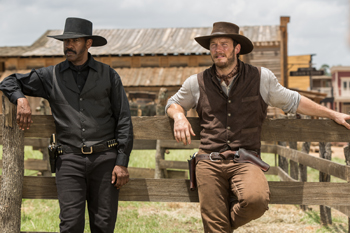 'Sturges's film is an amazing film, made at a time when America saw themselves a certain way," Fuqua continues, describing the difference between the 1960 film and the new film. 'There was a time that the Western hero had a black-and-white wholesomeness. But the Western hero changes with time, and that determines his translation in the world. Later, the Western hero got darker, more complex, a little more dangerous. The John Wayne from Stagecoach became the John Wayne in The Searchers; after Vietnam, you have movies like The Wild Bunch, where they are bad guys but you fell in love with them anyway. People could relate to a character that was more complex, wasn't so wholesome."
'Sturges's film is an amazing film, made at a time when America saw themselves a certain way," Fuqua continues, describing the difference between the 1960 film and the new film. 'There was a time that the Western hero had a black-and-white wholesomeness. But the Western hero changes with time, and that determines his translation in the world. Later, the Western hero got darker, more complex, a little more dangerous. The John Wayne from Stagecoach became the John Wayne in The Searchers; after Vietnam, you have movies like The Wild Bunch, where they are bad guys but you fell in love with them anyway. People could relate to a character that was more complex, wasn't so wholesome." 'Today, as long as his morals are still intact, you can make a darker hero, you can make him more complex," Antoine Fuqua says. 'You can make them reflect how the world is today. Denzel Washington playing the lead in a Western back then would never have happened, because Americans never saw themselves in that way – but today, the Western has to feel like the world we live in. Still, no matter what, good guys are good guys and bad guys are bad guys; as we prepared this movie, I'd go back and watch The Seven Samurai to make sure that the DNA of this movie stayed in place, which is, morally, no matter who you are or what you're doing, you have to do the right thing for people who need help."
In Antoine Fuqua's vision, the film was shot in a classic way – avoiding visual effects when possible, and choosing instead to work with some of the world's greatest stuntmen to perform practical stunts, capturing the action in-camera. Chris Pratt was impressed: 'I've done a lot of big movies similar in scale and scope with giant sets, but most of those – Guardians of the Galaxy, Jurassic World – relied heavily on visual effects," he says. 'On this movie, we did practical stunts. Every horse fall you see is a stuntman falling off a horse traveling at a fast speed, and there are hundreds of them."
About The Cast
The Seven
Two-time Academy Award® winner Denzel Washington takes the lead of The Magnificent Seven as Chisolm, one of the few members of the seven who operate with something of a tacit approval from law enforcement. 'He'd tell you he's a duly sworn warrant officer from Wichita, Kansas and a licensed peace officer in Arkansas, Indian Territory, Nebraska, and seven other states," says Denzel Washington. 'He's a black man in the frontier, in a position of authority, so he needs to let people know he has authority from the government to do this job. He's a loner; he's unafraid. He's a master with his weapon but he's not a braggart; he's a lonely, honorable, courageous man, not especially used to dealing with people."
'We did a lot of research into guys like that – free black men truly from the West who did that for a living – so we took that and ran with it," says Antoine Fuqua. 'When we first meet Chisolm, he's just going after bad guys and bringing them back to the judge or killing them – either way is OK. He's in a very cold, dark place – all business – until Haley Bennett's character says there's a man in town who is killing men, women and children, and his reaction to that is what stops him."
'In this town, this evil man has broken backs, literally, and the spirits, of these people," Washington explains. 'I think that affects each of the seven in a different way, but they're determined to do something about it. Chisolm is coming there to do a job – this town is being taken over – and it happens that he's also looking for revenge for something that happened to his family. Because he wasn't able to serve justice on his own situation, for his own family, he's been attracted to a desire to right wrongs, to bring evil people to jail, to pay for their crimes."
Though performances from Takashi Shimura and Yul Brynner have passed into legend after previous retellings of this story, Washington wasn't worried or even influenced by any previous version. 'I've never seen The Magnificent Seven, and I don't approach a character based on past movies," he says. 'I don't know how to play -mythical' – I don't know what that means. I just look at the script and what it says about this man in these circumstances."
Chris Pratt joins in as Faraday, a gambler with a wise mouth but a cool hand with the pistol. 'Faraday is a bit of a fox, a trickster," says the star of Guardians of the Galaxy and Jurassic World. 'He's lighthearted, a gambler, a drinker, a cigar smoker, he loves the ladies – but he's deadly. He keeps his head cool, even in the most dangerous situations. He's tranquillo – he moves slow, slow is smooth, and smooth is fast. He is efficient in killing because he keeps a cool head."
'The relationship between Chisolm and Faraday, as well as the other characters, is what really drives this movie," Chris Pratt continues. 'These are men who, through the course of their lives, have dealt with being killers in various ways. Faraday has killed a lot of men, but he's never felt bad about it. He assumed that he was bad. And that's part of the reason why he wants to help the people of this town – if he can do that, maybe he was wrong, maybe there's some good in him, maybe he's not so bad after all. It's something he's never experienced, a positive feeling for helping other people, seeing something bigger than himself and being willing to fight for it."
'Chris Pratt is the nicest man in the world. Who you think you see is exactly who he is," says Antoine Fuqua. 'All-American, funny, always charming, always positive, always there to help people."
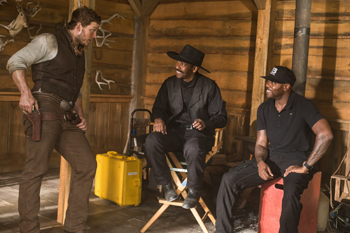 In the original film, Steve McQueen played off of Yul Brynner – and while Faraday is a different role, Antoine Fuqua was looking for a similar charming dynamic. 'He has the charisma and the charm of a Steve McQueen – we asked, who's cool? Who has the charm? Who is a movie star? And that dude just has it."
In the original film, Steve McQueen played off of Yul Brynner – and while Faraday is a different role, Antoine Fuqua was looking for a similar charming dynamic. 'He has the charisma and the charm of a Steve McQueen – we asked, who's cool? Who has the charm? Who is a movie star? And that dude just has it." For the role of sharpshooter Goodnight Robicheaux, the filmmakers cast Ethan Hawke, who co-starred opposite Washington in his Oscar®-winning Training Day performance for Fuqua. That history paid dividends. 'We were at an IMAX screening for The Equalizer and he cornered me, grabbed me by my jacket – he'd read somewhere that I was going to do The Magnificent Seven, and he said, -If you do this movie, I'm doing it with you. I don't care what role I'm playing, I'm in.' Ethan Hawke wanted to do it before I even talked to Denzel Washington."
'My character, Goodnight, is kind of a lost soul," says Ethan Hawke. 'He's a guy who probably hasn't gone home after the Civil War, he just wandered out West. They wouldn't call it PTSD, but there is real trauma in treating life cheaply – in having absolute disregard for life and death. I like to think of Goodnight as somebody who's haunted by those demons. He's lost, and this whole cause gives him a place to be."
'Ethan Hawke really dug for a character that was not necessarily on the page," says Todd Black. 'The more he sat with us and the writers, he wanted to invent a modern-day issue, such as PTSD, and make us realise that it existed then, it just didn't have a name to it. He came up with that whole idea."
As for why his character joins the seven, Ethan Hawke says, 'Goodnight has a tremendous amount of respect for Chisolm – he reminds Goodnight of the best part of himself. He feels a sense of duty to honour that friendship, like maybe there's something in the past which he owes this person."
Veteran actor Vincent D'Onofrio takes the part of Jack Horne, a mountain man who has survived on his own in the wilderness and proves to be as tough as they come – utilising any manner of weapon at hand in the fight to save the town. 'There was a lot of physical work," Vincent D'Onofrio explains. 'Tomahawks, knives, a long rifle – it wasn't just -draw your guns and shoot.' I had to run around and break people's necks, hatchet them."
In his long and varied career, Vincent D'Onofrio has garnered a reputation as an actor's actor, a consummate professional who can be counted on not only to give an excellent performance, but to help in subtle ways to make the production run as smoothly as possible. In the case of The Magnificent Seven, that meant serving as something of a de facto leader on the set, becoming a mentor of sorts to the younger actors. 'He's a powerful actor and a powerful person," says Antoine Fuqua. 'Having him and Denzel Washington together was a great dynamic, because they are two big guys with a lot of personality. Denzel Washington often likes to quietly take people and lead from behind, which I think he learned from Mandela. Vincent would take charge – he fathered the other guys. When we weren't filming, they were all just hanging as a pack, Vincent D'Onofrio with the younger actors."
'He exudes strength and confidence on top of the fact that he's a very, very fine actor," Roger Birnbaum elaborates. 'The younger guys did look to him, and they looked to him because he put it out there – -I'm here for you.'"
Korean star Byung-Hun Lee takes the role of Billy Rocks, Goodnight's friend and confidant. Antoine Fuqua says that he was familiar with Lee's work for years before serendipity brought them together. 'I was a fan of BH when he did a film called A Bittersweet Life. I saw it years ago, and actually wanted to remake it. But years had passed, so when he walked into my office before we cast him, I didn't realise it was the same guy – and when he said he'd done that movie, I got really excited – 'Oh my God, I'm a huge fan.'"
'Our casting director, Mary Vernieu, told us about BH, and he came in and auditioned and blew everybody else away," says Todd Black. 'It was his silent presence, his beautiful-looking face, and obviously his talent with the knives – his audition was just great."
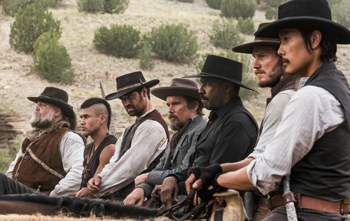 Mexican-born actor Manuel Garcia-Rulfo joins the seven as Vasquez, an outlaw on the run from bounty hunters like Chisolm. 'Vasquez has been on the run for several months because of a crime he committed," Manuel Garcia-Rulfo explains. 'All his life, he's been a bandit and a robber – a criminal – but this time, he's committed a high crime, killing an important person. He's been on the run for several months, but Chisolm, the bounty hunter, knows all about him, and brings Emma along to help recruit him."
Mexican-born actor Manuel Garcia-Rulfo joins the seven as Vasquez, an outlaw on the run from bounty hunters like Chisolm. 'Vasquez has been on the run for several months because of a crime he committed," Manuel Garcia-Rulfo explains. 'All his life, he's been a bandit and a robber – a criminal – but this time, he's committed a high crime, killing an important person. He's been on the run for several months, but Chisolm, the bounty hunter, knows all about him, and brings Emma along to help recruit him." Manuel Garcia-Rulfo says that his character's violence is all done with a twinkle in his eye. 'Vasquez loves gunfighting. He's good at it," he says. 'He's clearly laughing when he's fighting – he loves it."
That enthusiasm comes naturally to the actor, according to Birnbaum. 'Manuel Garcia-Rulfo is one of the nicest guys you'll ever meet in your life," he says. 'He was so excited to be part of this movie, and wore that every single day. You can see it in his eyes – his eyes sparkle when he's on the screen, and they do in real life, too. He brought a flavor to this seven that I think helps make it sing."
The seven are completed by Red Harvest, a Comanche Indian who joins the pack. The part is played by Martin Sensmeier, an actor of Koyukon-Athabascan and Tlingit Indian descent. 'Antoine Fuqua was very sensitive to the culture and wanted to do it right," says Martin Sensmeier. 'As a native person, I think that's really important. He did everything he could to ensure that Native Americans were portrayed in a respectful way. He did his homework and had a vision of what he wanted."
That's a sensitivity that wasn't always evident in Hollywood films of the past, to say the least. 'In all of the old movies, you have these Italian guys playing the Indians, and the way they acted was always so silly to me, so I never really identified with those characters. -Why are they doing that? Why are they screaming like that? Why are they wearing that?' So when we would go outside and play cowboys and Indians, I always pretended to be a cowboy. And as you get older, you start to realize the reality of how Hollywood has portrayed Native Americans. But I still love Westerns, so it's a huge honor to have the chance to play in this one. I'm playing a Comanche, and our Comanche cultural advisor said that the director and producers have been incredibly sensitive to the culture."
Equally importantly, Martin Sensmeier found ways that he related to his specific character of Red Harvest. 'He's Comanche, but he's not with his tribe. When I was shooting the movie, I wasn't with my tribe – my tribe is in Alaska."
'Red Harvest was a difficult role to cast," says Todd Black. 'Obviously it was critical to cast a Native American actor, but we needed someone who looked the role and could express himself without a lot of dialogue. A number of the actors that we auditioned didn't have that quiet quality. Martin had a quiet quality that was very expressive."
'That guy is the personification of Zen and peace," Roger Birnbaum says. 'In his real life, he's a very, very disciplined guy. Everything he did off-screen, he brought to his role on-screen."
Emma Cullen
In the film, when Bogue's forces murder Matthew Cullen (Matt Bomer), his wife Emma takes charge, finding Chisolm and convincing him to defend the town. For the role of Emma Cullen, the filmmakers cast Haley Bennett, who had worked with Antoine Fuqua, Todd Black, and Denzel Washington on The Equalizer.
'Emma suffers a great loss and takes matters into her own hands to ensure that she stops this man, Bartholomew Bogue, from victimizing her town," says Haley Bennett. 'Emma defies all of the stereotypes – she's not objectified or submissive or victimized. The film is set at a time when women didn't have equal rights, so it's inspiring for me to portray her as complex, a person with a voice who can evoke change. That's another way that this telling of the story is different."
'Haley Bennett played a true character of the time," says Roger Birnbaum. 'If you were a man and a woman heading out West to start a new life, both individuals had to be strong people. Not that every woman or every man was strong, but I think if they weren't, they didn't make it. You see Emma and Matthew struggling to start a life together in building this town in what had been the wilderness. So, when Matthew is killed, she's not any less strong – she taps into it and pulls on that strength to pull her through."
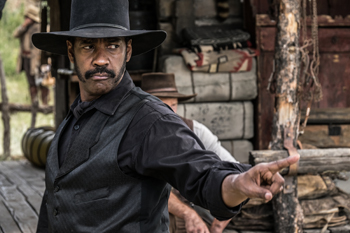 Bartholomew Bogue
Bartholomew Bogue As the villain Bartholomew Bogue, the filmmakers cast Peter Sarsgaard. 'He's the instigator, the person who has set down the harsh rules to make the town uninhabitable," he says. 'It's his own sense of swift justice that has terrorised the community. One of the things that attracted me to playing Bogue is his own sense of personal grandeur, the sense that he was somehow larger than life. He had a kind of unapologetic narcissism that I found very interesting."
For advice on what it was like to work with Antoine Fuqua, Peter Sarsgaard turned to family: his brother-in-law is Jake Gyllenhaal, who starred for Fuqua in Southpaw. 'Antoine Fuqua gives you the most room you could every possibly want as an actor – and then he figures out, on the spot, how he's going to shoot that and turn it into the narrative," says Peter Sarsgaard. 'I'd actually been told that before I started, because my brother-in-law worked with Antoine Fuqua. Just knowing that, even if you're playing exactly the intentions of the script and saying the exact lines, you take ownership of everything."
About The Training, Action, And Stunts
Before filming began, the actors began riding and weapons training. 'They did horse training, gun training, learning how to twirl and spin the guns," says Antoine Fuqua. 'They went shooting with real weapons, just so they can get the feel of what those weapons really do. They wore their holsters around all the time to get used to their weight. They wore their boots for months – and do you know how hard it is for a city boy to walk in cowboy boots on dirt every day?"
But these training sessions weren't just fun-and-games; the director was watching closely, because each character's specific action – the way he goes into the battle – would be informed by the actors' personalities, their real-life skills, and what they do best. 'You're always trying to find action bits that fit a character's personality, so that the action has its own character based on who they are," says Antoine Fuqua. 'It's always a discovery, and the process of the cowboy training was where I really started to design my action – I wanted to see what these guys could do."
For example, Denzel Washington's action rose out of his skill as a boxer. 'With an actor as powerful as Denzel Washington, everything's part of his character; you can't design action and then think he's going to fit into the action," says Antoine Fuqua. 'I noticed how quick Denzel Washington was with the draw – I think it's because he's a boxer; he uses those small, quick-twitch muscles. So we decided that he would have one gun, not two – Chisolm is so precise that he only needs one gun. And he has it on his side, hanging out, which is not a traditional way of holding a gun in a gunfight. It's something that he, as a character, developed."
But these choices weren't limited to Denzel Washington: each of the seven got unique action designed by the director, as Antoine Fuqua explains. 'What made Chris Pratt's character's action work was that he was bold – he wasn't afraid to be shot, so he would walk right at you, shooting, playing chicken. He knew he was a better shot than you, so he didn't have to be quick – he just had to be precise. That also came out of rehearsal – during practice, Chris Pratt was almost like a Navy SEAL, coming right at you, so I started designing the action based on that. Vincent was amazing – he was just like a bear. He had a faith about what his character had developed into, so his action was very aggressive; this beast that comes out of him that just keeps coming and coming, and no matter what you do, he's not going to stop. BH is like a ballet dancer – very athletic, elegant, and regal – so we determined that he'd be better with the knives; he knew how to do that, so I decided that I could play with that skill. Manuel, during rehearsal, found it natural for him to take the guns out and spin them, so that became his thing; he's good with two guns, and it developed that way. Martin was better with the bow and arrow, because he had shot them before."
For gunslinging training, the seven worked with Thell Reed, a quick-draw expert since he was a boy, who toured with Gene Autry's Wild West show and later lent his expertise and skill behind the scenes of 'Gunsmoke" and countless Western films.
'That guy is the real deal," says Chris Pratt. 'He's in his mid-70s, and at 14 he was a world champion gunslinger, he went on Ed Sullivan – and since then he's worked on every Western in the world. The Colt Peacemakers are single action, not semi auto – they're difficult to fire, difficult to reload – but they're smooth and fun guns. It shows why the Colt revolver really was the gun that won the west."
But as the actors tell it, the quickness of the quick-draw isn't necessarily about the speed of the pull. As Washington says, 'What Thell Reed always said was -Smooth is fast.' I have fast hands – I've been boxing for years. I'm just fast. But he was always telling me, -Slow down, slow down – smooth is fast.'"
Though all of the actors had weapons training and learned to ride horses, Martin Sensmeier had special training in bareback riding and the bow and arrow. 'I spent six weeks in Louisiana before I started shooting, and that's not to mention the two weeks of training I did in Los Angeles before I went out there," he recalls. 'I rode bareback every single day, learning from Scotty Augere, who's Blackfeet, from Montana, and Danny Edmo, who was my stunt double – learning from those two and some of the best horsemen out there. Riding bareback is a lot tougher than riding with a saddle – you use your legs a lot more. I fell off a couple of times, but then I started picking it up, and now I love it. I actually prefer it to a saddle – I feel more of a connection with the horse and it feels more natural."
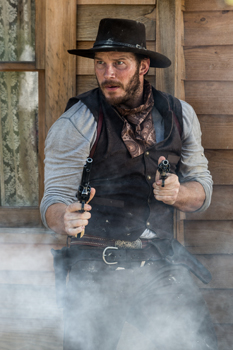 'We also did bow and arrow training and rifle and gun training, because Red Harvest does everything – shoots the bow, guns, tomahawks, knives… I actually shoot a bow myself, so getting to use one in a film was pretty awesome," Martin Sensmeier continues. 'And I was in the gym twice a day, and I was eating super clean – I was already a gym rat, so I just started changing up my workouts to get in the best shape possible."
'We also did bow and arrow training and rifle and gun training, because Red Harvest does everything – shoots the bow, guns, tomahawks, knives… I actually shoot a bow myself, so getting to use one in a film was pretty awesome," Martin Sensmeier continues. 'And I was in the gym twice a day, and I was eating super clean – I was already a gym rat, so I just started changing up my workouts to get in the best shape possible." Manuel Garcia-Rulfo says that all of this training was a chance to act like a kid again. 'I grew up on a ranch in Mexico, so I knew how to ride horses, but to be part of a Western – it doesn't get better than that," he says. 'I was there with bullets flying, explosions, fire, smoke, shooting with two guns – I was so excited, so happy. To make a living by doing the things you did as a kid? It's just amazing."
Haley Bennett also received weapons and riding training to befit her character. 'I think that's a powerful image, a woman taking the bull by the horns," she says. 'Pioneer women were very tough – they had to be, because the men go off for long periods of time, and the women would have to be able to protect themselves and their homes."
For the stunts that were too difficult or dangerous for the lead actors, the filmmakers turned to an elite group of stuntmen who have expertise in falling off horses and buildings. 'Jeff Dashnaw and his team were amazing," says Antoine Fuqua. 'We literally had guys who did movies with John Wayne and John Ford back in the day, and they were out there taking horse falls and being shot to be part of this movie. I can't even count how many of the guys got shot off horses and stunts through windows."
'Antoine didn't want it to be a CG or VFX movie, so we tried to do so many stunts in camera, and that's what made it so complicated," says Todd Black. 'We had the top stuntpeople in the business, Clint Eastwood's stuntpeople – literally the top stunt coordinator and the best people you could get. When you're doing horse stunts and falling from buildings, it's very dangerous, and we had to make it look real."
Jeff Dashnaw's crew of stuntmen mostly grew up riding horses that they have parlayed into day jobs like professional rodeo cowboy. Most of these stuntmen die multiple times in the movie. For the stuntmen who were thrown off the roof, their falls were broken by three inches of foam painted to look like wood on top and an eight-inch pad buried underneath the dirt.
About The Design And Costumes
An hour outside of Baton Rouge, Louisiana, production designer Derek Hill built the town of Rose Creek. And we aren't talking one street of facades: he built the entire town, multiple streets, building the actual buildings and decorating their interiors.
Antoine Fuqua turned to Derek Hill after collaborating with the designer on Olympus Has Fallen. 'On that movie, Derek Hill and I walked out to a cow pasture and he built Washington DC and the White House. For this movie, we found land where we could create an entire town and all of the action that we were going to do on it."
'When he showed me sketches, I said, -You're going to build all of that?' and because he knows me, he said, -I gotta make all of this, overbuild it, because you'll probably want to shoot in all of it,'" Antoine Fuqua continues. 'When people see the movie, they'll be amazed by the whole town he created."
In the end, Hill was responsible for 25 buildings, a church, and a fully functional livery stable.
'Everything was practical, everything was real," says Peter Sarsgaard. 'You could open a cabinet and the cup was usable. The whole thing felt lived in. That's the way Antoine Fuqua shoots – he had to make everything like that, because we might end up needing that door or that room."
Costume designer Sharen Davis, a two-time Oscar® nominee for her work on Ray and Dreamgirls, brought a similar authenticity to the wardrobe. 'I wanted to combine the spaghetti western with a realistic look – not a documentary, but a real look at western clothing," she says. 'I was trying to find a balance between those concepts."
Davis' costumes were influenced most by the characters' most important accessory: their gun, belt, and holster. 'After they picked their holster and gun, that helped me to understand who the character is," she says. 'The property team sent me photos of everyone's weapons and gun belts, and that was inspiring."
From there, Sharen Davis began her design of each character. 'Denzel Washington had done a lot of research on this time period and found a person he wanted to emulate," she recalls. 'We spun off from that person. Denzel Washington wears black, and that person didn't, but that actual person inspired a look with texture and layers."
'We decided that Chris Pratt's character would look best less complicated, but his clothes are very body conscious," Sharen Davis continues. 'He's carefree with his look, but we still wanted it to be sexy. We started with a little more color, and worked down to less color and more texture. Chris Pratt had great ideas and was so responsive and enthusiastic."
Hawke's character was both easy and very creatively fulfilling for Sharen Davis: 'I actually illustrated the look and it went from paper to Ethan Hawke," she says. 'He looks amazing – I really feel his character breaks away from the others."
'Working on Horne was also really fun," Sharen Davis continues. 'I met with Vincent for over an hour. He's a character who lives in the mountain and is very secluded, so we went for it, with a lot of animal hide and fur. Once he put it on, it was just Horne."
For Manuel Garcia-Rulfo's character, Sharen Davis says, 'I wanted to show that Vasquez was definitely from somewhere in Mexico, but also that he's travelled in the United States. So we did a little mixing with his look – a little Western, and a little Mexican."
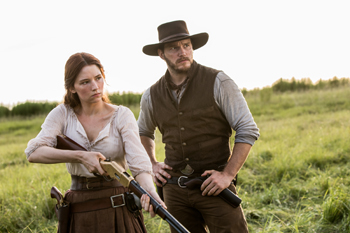 'Billy Rocks has an awesome hat, which we both created. He also has an amazing gun belt, so I really had to work around what was around his waist. For example, he couldn't wear a jacket because of that belt. So we went very tight fitting, lots of texture, not much color, lots of metal," Sharen Davis explains.
'Billy Rocks has an awesome hat, which we both created. He also has an amazing gun belt, so I really had to work around what was around his waist. For example, he couldn't wear a jacket because of that belt. So we went very tight fitting, lots of texture, not much color, lots of metal," Sharen Davis explains. Rounding out the seven, 'We underplayed the look for Red Harvest," she says. 'We didn't push the clothes and let the makeup do the talking. I went very traditional with him, very streamlined, and let jewellery denote his tribe."
The other major character whose costume stands out is Bartholomew Bogue, the villain. His look, Sharen Davis says, went through a bit of an evolution. She says, 'At first, I pushed a nouveau riche look, but later, we decided, what if he's more like a Rockefeller, old money? He looks very dapper – his clothes are a little frayed, like at one time they were very expensive and he's held onto it. He's always in a wonderful tie and kerchief, a man of money."
Finding hats and boots was one of the trickier pieces of costume, as Sharen Davis says each actor needed to try on 15 or 20 of each before finding the right one.
About The Score
Approaching the music for the film was a daunting challenge, as there are few themes as famous as the original film's. 'The score from the original became as big as the movie," notes Antoine Fuqua. 'It's hard to compete with that." But the new movie would need music, and the result was a bittersweet but beautiful collaboration.
After teaming up on Southpaw, Antoine Fuqua became close with Academy Award®-winning composer James Horner. It was Horner's urging that convinced Antoine Fuqua to make The Magnificent Seven a priority.
Sadly, James Horner passed away last summer in an airplane accident. It was only later that Antoine Fuquaa realised that the composer had bequeathed him a gift. 'While we were shooting, I got a call – -James Horner left a gift for you.' I didn't know what it was, I thought maybe he had bought something for me related to Southpaw," Antoine Fuqua recalls. Simon Franglen, James Horner's longtime programmer and arranger, came to the set with that gift – a suite of themes. 'Simon Franglen said, -James Horner wrote these themes for Magnificent Seven.' He wrote them off the script – who does that? The movie may not have happened, and he had written themes, rough stuff, orchestral stuff. It was glorious. It floored me."
Simon Franglen would complete the score, basing his work on the music that Horner had started. 'James Horner was one of my closest friends, and I spoke to him the day before he died," Simon Franglen says. 'This project was very dear to him – he was really looking forward to it. After he died, we wanted to finish what he had started and follow through with his vision for the score. It was really important to him to do this movie, and I hope people will think of it as a legacy for James' incredible volume of work."
As Simon Franglen stepped in, he was well aware that he was following in the footsteps of two masters of film music: Horner, of course, and also Elmer Bernstein, whose theme for the original Magnificent Seven is one of the most famous pieces of film music ever written. Simon Franglen's approach in completing the score was to make something entirely new: 'Bernstein was one of the greats and his Magnificent Seven theme is one of the great themes in all of film," Simon Franglen says. 'So to try to reimagine that, to try to make it into something different, would be sacrilegious. However, in completing James' score, we tried to keep some resonance of Elmer's theme in there – to have the heritage of the original Magnificent Seven but still to honor James Horner' vision and do something new."
Simon Franglen approached the score with a reverence for the genre but the score also needed its own voice, a contemporary feel that would sound distinct and different from anything that has come before, as the composer explains: 'Antoine Fuqua has made a film that has all of the tradition of a great cowboy film, but it's updated and feels contemporary; it has some grit and edge that weren't there in the days of old. The score honours the great orchestral tradition of cowboy music in films which gave us a direction to head in - but with the textures and rhythmic intensity of something current, a 21st century version of a western score. It had to be big and bold. We used a lot of brass, which is part of the cowboy motif that started with Aaron Copland in the 1920s and has moved through the cowboy music to the current day. We used handclaps, exotic bowed and wind instruments, disgruntled banjos and aggressive guitar work to give the score an unexpected sound. In its core this is an action film about guns for hire, so I had to bring a muscular, arrogant quality to the action cues, but as the seven evolve to become heroes, you need that classic widescreen orchestral sound. That's something that only a world-class orchestra of 80 players can do."
The Magnificent Seven represented a major step forward for Simon Franglen – sharing the credit with Horner, this film is his first dramatic feature film credit as composer. 'It was a joy to work on. Every morning I went into the studio with a smile on my face…" says Simon Franglen. 'After all, cowboy music is in our DNA – it's everybody's childhood". 'To be able to finish a project that James Horner began and which was so important to him, to have the opportunity to score Antoine Fuqua's glorious western, to be able to write something that I hope reflects the film's unique blend of the old and the new was a labour of love throughout."
When Simon Franglen's score was complete, he and Antoine Fuqua planned a special treat for the end of the film. 'What James Horner started and Simon Franglen finished was a score that they made their own; it has a scope and texture that feels contemporary, but stays true to the genre," Antoine Fuqua concludes. 'Then, for the end of the movie, we took the original theme by Elmer Bernstein and brought in an 87-piece orchestra. It takes me back to when I was 12, seeing that movie for the first time, and thinking, -I want to be one of those guys.'"
The Magnificent Seven
Release Date: September 29th, 2016
MORE
- Mission: Impossible Fallout
- Glenn Close The Wife
- Allison Chhorn Stanley's Mouth Interview
- Benicio Del Toro Sicario: Day of the Soldado
- Dame Judi Dench Tea With The Dames
- Sandra Bullock Ocean's 8
- Chris Pratt Jurassic World: Fallen Kingdom
- Claudia Sangiorgi Dalimore and Michelle Grace...
- Rachel McAdams Disobedience Interview
- Sebastián Lelio and Alessandro Nivola...
- Perri Cummings Trench Interview



